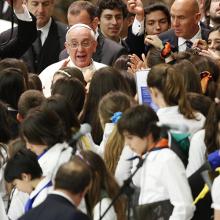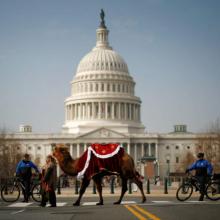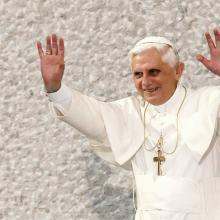pope benedict xvi
Pope Emeritus Benedict XVI on Tuesday asked victims of sexual abuse in the Catholic Church for forgiveness but rejected allegations that he was involved in any cover-up. The retired pontiff was responding to an independent report, released on January 20, which chronicles decades of alleged abuse and misconduct in the archdiocese of Munich, which he led as Cardinal Joseph Ratzinger from 1977 and 1982.
Joaquin Navarro-Valls, who transformed the Vatican’s press office into a modern media operation, has died.
The former Vatican spokesman, 80, was a Spaniard and the first layperson and journalist to hold the job, when he was appointed by Pope John Paul II in 1984. Navarro-Valls served as the papal spokesman for 22 years, embracing technology and holding regular, colorful briefings.
Pope Francis has defrocked an Italian priest who was found guilty of child sex abuse, three years after overturning predecessor Benedict XVI’s decision to do the same after allegations against the priest first came to light.
Mauro Inzoli, 67, was initially defrocked in 2012, after he was first accused of abusing minors, but Francis reversed that decision in 2014, ordering the priest to stay away from children and retire to “a life of prayer and humble discretion.”
According to CNN, the decision to nominate Gingrich has already been made, but the announcement is pending approval from the Office of Government Ethics. Earlier this year, Newt Gingrich confirmed his wife was in the running for the job. The White House declined comment on May 15.
The talk — a surprise for all in the audience — recapitulated the key themes of the Argentinian pope’s view of the human person: We are all related and interconnected; scientific and technological progress must not be disconnected from social justice and care for the neighbor; and that the world needs tenderness.
I am a scholar of modern Catholicism and its relations with the world of today. From my perspective, there are two essential elements of this talk that are important to understand: the message of the pope and his use of the media.
Pope Francis used his traditional Easter Sunday message to call the bombing of a refugee convoy near Aleppo, Syria, a “despicable attack”, and urged world leaders to “prevent the spread of conflicts” despite mounting tensions in Syria and North Korea.
In his Easter blessing, known as “Urbi et Orbi” (“to the city and the world”), the pope urged the faithful to remember “all those forced to leave their homelands as a result of armed conflicts, terrorist attacks, famine, and oppressive regimes.”
At this time of year, we often see animals subjected to cruel holiday stunts, or treated as living props in our confusing pageantry.
Domino’s Japan recently announced it was canceling its ill-conceived plan to train reindeer to deliver pizza, following a PETA Asia campaign. And just this week, a man was charged with abusing a camel that was part of a hospital’s live Nativity scene in Pikeville, Ky.
These new cardinals include prelates from 11 dioceses and six countries that have never before had a cardinal, and from places far outside the traditional European orbit of ecclesiastical influence: Albania, for example, plus the Central African Republic, Lesotho, Mauritius, Bangladesh, Malaysia, and Papua New Guinea.
But the real surprise in these picks, as in past appointments, is that they came as a complete surprise to many of the new cardinals themselves, and to the pope’s closest collaborators.
Centuries ago, of course, the love lives of the popes — and cardinals and various powerful prelates — became a source of constant fascination and scandal. In these days of great anxiety in the church about the role of gays and gay rights, leaking stories about papal crushes can also be useful for signaling that a pope is straight, and not just straight but also virile and seriously attractive to women, an attraction he naturally must renounce.
But it’s still a balancing act — trying to advertise a pontiff’s shared humanity with the flock while not encouraging prurient speculation.

Image via REUTERS / Max Rossi / RNS
A Vatican ceremony June 28 featuring a rare joint appearance by Pope Francis and his predecessor seemed aimed at tamping down speculation about the unusual circumstance of having two living popes.
In recent weeks debate has erupted over whether there are two popes sharing authority in the church, or whether Francis is the sole successor of St. Peter.

Image via REUTERS/Osservatore Romano/Handout via Reuters/RNS
The Vatican has always been a hothouse for conspiracy theories, and a new controversy over the so-called Third Secret of Fatima is showing just how persistent such fixations can be — to the extent that the latest episode even forced Pope Emeritus Benedict XVI out of seclusion to refute claims that he once shaded the truth about the mysterious prophecy.

Image via Osservatore Romano / Handout via Reuters / RNS
Pope Francis launched the jubilee of mercy on Dec. 8 with the opening of the Vatican’s holy door, joined by his predecessor Pope Emeritus Benedict XVI, and thousands of pilgrims gathered in St. Peter’s Square, surrounded by heavy security.
“This extraordinary year is itself a gift of grace,” Francis told the faithful gathered at the Vatican.
“To pass through the holy door means to rediscover the infinite mercy of the Father who welcomes everyone and goes out personally to encounter each of them.”

Image via Max Rossi/REUTERS/RNS
Figuring out why Pope Francis has upended so many expectations and what he might be contemplating for the future of the Catholic Church has become a parlor game almost as popular as the pontiff himself.
A single key can unlock these questions: Francis’ long-standing identity as a Jesuit priest.
It’s an all-encompassing personal and professional definition that the former Cardinal Jorge Bergoglio brought with him from Buenos Aires, and one that continues to shape almost everything he does as pope — even though he is the first pontiff to take his name from the 13th century Italian monk from Assisi who was famous for living with the poor and preaching to the animals.
“He may act like a Franciscan but he thinks like a Jesuit,” quipped the Rev. Thomas Reese, a fellow Jesuit who is a columnist for National Catholic Reporter.
Pope Francis has repeatedly said he expects his papacy to be a brief one, but Cardinal Walter Kasper is working to ensure that the pontiff’s legacy endures long after this pope leaves the scene.
From the first days of his pontificate two years ago, Francis singled out Kasper for high praise; ever since, the retired German cardinal is frequently known as “the pope’s theologian.”
It’s a moniker the churchman shrugs off with a smile, yet it’s also a label he’s doing nothing to shake, especially in light of Kasper’s most recent book, published last month — a short work that basically describes Francis as a theologian in his own right whose pastoral approach is setting Catholicism on a new course.
The title of the book, from the U.S. Catholic publishing house Paulist Press, says it all: Pope Francis’ Revolution of Tenderness and Love.
But the title also sums up the two-pronged challenge for those, like Kasper, who hope that Francis’ papacy represents lasting change.
It was a good thing for Trinitas Cellars that Cardinal Jorge Mario Bergoglio took the name Pope Francis, and not, say Pope Malbecius.
When the Argentine cardinal became pope in 2013, Trinitas didn’t have any malbec — the famous Argentine grape — in its cellars. But it happened to have a few barrels of cabernet franc.
Behold! Thus was born “Cabernet FRANCis,” a 2012 red wine from Trinitas, a Catholic-owned winery nestled behind the iconic grape crusher statue at the southern foot of the Napa Valley.
“People kept asking me, ‘Why didn’t you make the pope a malbec?’” said Garrett Busch, the 28-year-old CEO of Trinitas, as he spoke in the winery’s book-lined library tasting room, a bottle of the wine before him. “And I’m like, ‘Come on guys, he made it easy on us.’”
Actually, the story is a bit more complicated. Trinitas, which is owned by Garrett’s parents, Tim and Steph Busch, made the family’s Catholic faith a part of business since its founding in 2002. Meetings and special events begin with prayer, winery dinners start with grace, and the winery’s website announces the family’s intention to “serve God in all they do.”
Even its name is Latin for the Trinity of Father, Son and Holy Ghost.
Gay marriage was never on the agenda at the recent Bishops’ Synod on the Family and the subject “did not cross our minds,” Pope Francis said in a new headline-grabbing interview.
Keeping to a format that has become a favorite for this pope, Francis used a high-profile interview to shed light on his thinking, and Vatican policies, on a number of hot-button social issues.
In an interview published Dec. 7, Francis told the Argentine daily, La Nacion, that the Catholic Church must help parents support their gay children. At the same time, he maintained that allowing, condoning or even adapting to same-sex marriage was still not on the church’s agenda.
This was one of several controversial issues he broached in the interview with papal biographer Elisabetta Pique:
Was there a secret plot to elect Cardinal Jorge Mario Bergoglio at the papal conclave last year?
Did Bergoglio — who became Pope Francis at that conclave — give the go-ahead to such a plan?
And does that campaign call his election, and his papacy, into question?
Such questions might sound like plot twists to a new Vatican thriller by Dan Brown, but they are actually the latest talking points promoted by some Catholic conservatives upset with the direction that Francis is leading the church.
The furor stems from a behind-the-scenes account of the March 2013 conclave, presented in a new book about Francis titled “The Great Reformer: Francis and the Making of a Radical Pope.”
In the last chapter of the biography, which focuses on Bergoglio’s early life in Argentina and career as a Jesuit, author Austen Ivereigh delivers an insider account of how a group of cardinals who wanted a reformer pope quietly sought to rally support for Bergoglio in the days leading up to the conclave.
Pope Francis on Oct. 27 waded into the controversial debate over the origins of human life, saying the big bang theory did not contradict the role of a divine creator, but even required it.
The pope was addressing the plenary assembly of the Pontifical Academy of Sciences, which gathered at the Vatican to discuss “Evolving Concepts of Nature.”
“When we read about Creation in Genesis, we run the risk of imagining God was a magician, with a magic wand able to do everything. But that is not so,” Francis said.
“He created human beings and let them develop according to the internal laws that he gave to each one so they would reach their fulfillment.”
Francis said the beginning of the world was not “a work of chaos” but created from a principle of love. He said sometimes competing beliefs in creation and evolution could co-exist.
They say you can feast like a king, and now you can eat like a pope after a young chef from the Vatican’s Swiss Guards published a cookbook featuring the favorite recipes of Pope Francis and his predecessors.
David Geisser, 24, who joined the elite Vatican security corps only a month ago, released his book, titled “Buon Appetito,” in Rome on Oct. 21.
The cookbook includes recipes for Francis’ favorite dishes, such as empanadas; roast sirloin, known as “colita de cuadril”; and “dulce de leche,” a milk-based Argentinian dessert that began appearing on Vatican dining tables when the archbishop of Buenos Aires was elected pope last year.
But it also features one of St. John Paul II’s favorite dishes, Polish pierogi, or stuffed dumplings, and Bavarian delicacies favored by Pope Emeritus Benedict XVI.
Eight years ago this Sept. 12, Pope Benedict XVI delivered a lecture at the University of Regensburg in Bavaria in which he seemed to diagnose Islam as a religion inherently flawed by fanaticism.
It was an undiplomatic assertion, to say the least — especially coming a day after the 9/11 anniversary — and it sparked an enormous outcry among Muslims and came to be seen as one of a series of missteps that would plague Benedict’s papacy until he resigned last year.
Now, with the Islamic State on the march in the Middle East, leaving a trail of horrifying brutality and bloodshed that has shocked the world, some of Benedict’s allies on the Catholic right are saying, in effect, “He told you so.”
“Regensburg was not so much the work of a professor or even a pope,” wrote the Rev. Raymond de Souza in a column for the National Catholic Register, a conservative publication. “It was the work of a prophet.”















